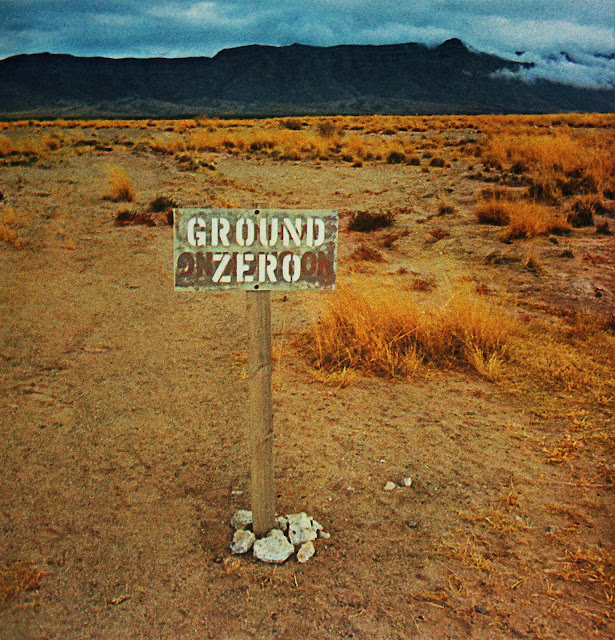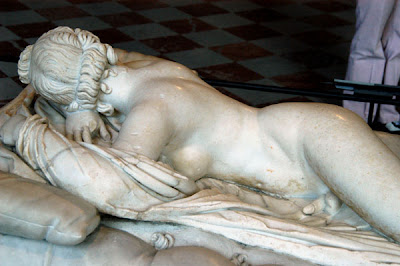The opening thesis of Benjamin’s celebrated last essay controversially poses a strategic alliance between “historical materialism” and theology.
Benjamin describes an elaborate eighteenth-century stage machine, the basis of a popular traveling show. This chess-playing automaton reduces to four elements: chessboard, “system of mirrors,” “puppet in Turkish attire” and “hunchbacked dwarf.”
Under Benjamin’s interpretative labor, each element generates a second, allegorical meaning, and the apparatus takes on philosophical status. The chessboard becomes the field of class struggle. The mirrors stand for the system of illusion that obscures what really takes place. The Turk becomes “’historical materialism’,” and the dwarf personifies theology.
Systematic deception makes it appear that “historical materialism” assists the exploited in their struggle. What actually happens in Benjamin’s allegorical image is that theology, concealing itself, gives its services to the exploited by manipulating the machinery of illusion and pulling the strings of “historical materialism.” This hidden, guiding infiltration of theology supplies the winning combination.
Benjamin’s quotation marks signal that something is fishy with historical materialism, or what goes by that name. A critique of pseudo-materialism will unfold in subsequent theses: Benjamin will distinguish a fraudulent “historical materialism” in the working class parties from one truly animated by Marx’s solidarity with the exploited and oppressed.
But keeping now to Benjamin’s formulations in the first thesis, we could pose some complicating questions:
In the allegory, the dwarf of theology is the only visible locus of autonomous agency. Benjamin encourages us to infer two more: the antagonists of class struggle, labor and capital. But strictly speaking, neither has substantial presence or determinate agency
in the image. Both are merely implied by the relation between a present agonic field, the chessboard, and the identity of the puppet, “’historical materialism’.”
The distribution of agency appears to open up a problematic that exceeds the configured elements of the allegory itself.
The eighteenth-century stage machine, called the Chess Automaton or Turk (
Schachtürke in German), is, to use I.A. Richards’ terms, the
vehicle of the allegory. The philosophical counterpart is the
tenor.
Let’s play along with Benjamin and immerse in this image. In the historical vehicle, the touring stage show performed for a paying public of amazed and suspicious spectators, one of whom must step from the crowd to become the Turk’s opponent.
Such an opponent – clearly an autonomous agent
vis-à-vis the Turk-Automaton – is entailed by the set-up: the show makes no sense otherwise.
If we then infer, as we must, such an opponent for the tenor as well, then we have the collective subject-position of capital in the class struggle – or in a longer vantage, the exploiter-oppressor, whatever the mode of production. (Or, to take its actual appearance-form as Benjamin was writing, Nazism.) But then where do the exploited sit? They cannot be identical with “historical materialism.” At most, this last merely claims to represent the interests of the exploited. And fraudulently at that, for the puppet is actually part of the machinery of deception.
The exploited and oppressed seem to be excluded from any active agency in the game – not at all what we would expect!
Perhaps Benjamin wants to say that the system of deception denies the exploited their potential historical agency and that the infiltration of “historical materialism” by theology creates an opening to agency. But in that case, the allegory would hardly represent a corrected concept of history, since now the theological dwarf is standing in for the exploited – a substitution rather than empowerment or self-empowerment.
A real problem emerges around the agency-subjectivity of the exploited and the status of the deceptive apparatus itself. What really is Benjamin asking us to imagine and consider?
Edgar Allen Poe saw the real machine in action in Richmond. In his short story, “Maelzel’s Chess-Player” (1936), he attempts to establish the necessity of a hidden human agent. “It is quite certain,” he writes, “that the operations of the Automaton are regulated by
mind, and by nothing else. Indeed this matter is susceptible of a mathematical demonstration
a priori. The only question then is of the
manner in which human agency is brought to bear.”
Indeed, what is an automaton? A machine that expends inputs of energy in a pre-programmed way, like a wound-up clock? Or a code, a string of ones and zeros, like the chess software you may have on your laptop?
The question points, quickly enough, to the problem of freedom that constitutes the concept of history.
In volume one of
Capital, Marx shows how labor-time systematically stolen in commodity production is the source of all surplus value. Value (
Wert), socially-necessary labor-time, emerges from the unfolding logic of exchange itself, as it transforms production into commodity production; labor-power takes the form of the value-producing commodity. Surplus value is extracted from the production-exchange process to the degree that wages are kept below the value that labor produces. Capital emerges as a new factor as value passes through the forms of money and commodities in exchange, adding to itself with each full circuit.
Capital, then, is “the valorization of value” in a boundless, self-renewing spiral movement: “self-valorizing value” (
sich verwertende Wert, chapter four). Capital, Marx writes with legible astonishment, is “the dominant subject” of a self-moving, self-driving, constantly expanding process. It is an “automatic subject” (
ein automatisches Subjekt), an “animated, inspirited monster” (
ein beseeltes Ungeheuer).
If there is an automaton that dominates history, it is this expansive master logic of capital accumulation, which exerts itself as a constant force of compulsion acting relentlessly on direct producers and capitalists alike.
This logic, the very essence of our global social process, operates “behind the backs” of individuals. History is a blind process, in that it has never yet been consciously directed by human reason; it is rather the effect of that reason separating itself from the will and interests of individuals and asserting itself
above and against them.
Reified, this process is experienced by these same individuals as unchangeable second nature, as the real objective power of things and facts that have taken possession of the autonomy promised to human beings.
So far there has been no global human subject, no human agency over the force of blindly operating and endured historical processes.
The exploited and oppressed, as those who have suffered most from this given even as their labor is its absolute condition, are the ever-present potential rupture in a history of continuous, accumulating toil, defeat and oppression.
The possibility that the exploited in struggle will gather their collective potentials and overthrow this logic of domination, Benjamin will reiterate again and again, is the possibility that human agency will emerge
for the first time – free human agency in the global sense that alone would constitute a universal history of liberation, of progress in emancipation.
Possibly, then, this is what the tenor of the allegory shows us, by pointing to the need for a critique of pseudo-materialism and to a theological concept of redemption that, for Benjamin, will turn out to include intrinsically the secular concept of revolutionary praxis. This praxis would reflect
the true and self-rescuing dialectic of matter and spirit.
This strategic concept of history, on the side of the exploited, is at least suggestively conveyed in the opening allegory – although, unless I’m mistaken, the image generates more questions than it can clearly answer. Answers will come in the subsequent theses, however.
And, needless to say, the problems of agency and praxis within and against a hostile, overpowering automatic process are the ones we actually still face.
(photo: Marc Wathieu) 




































